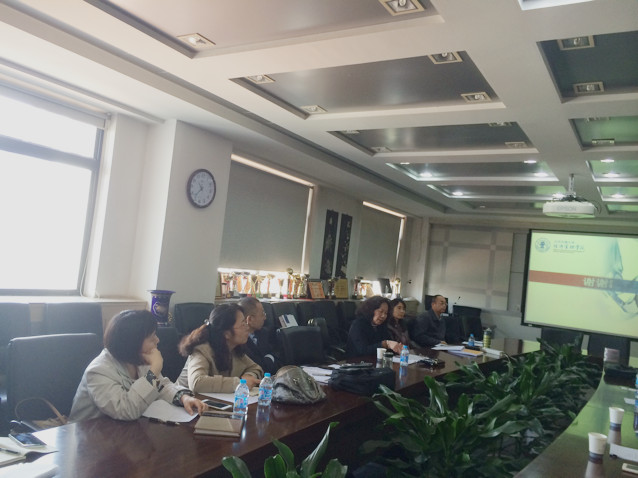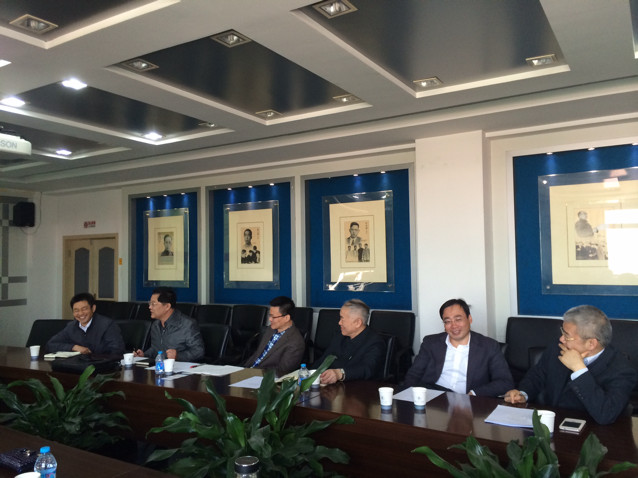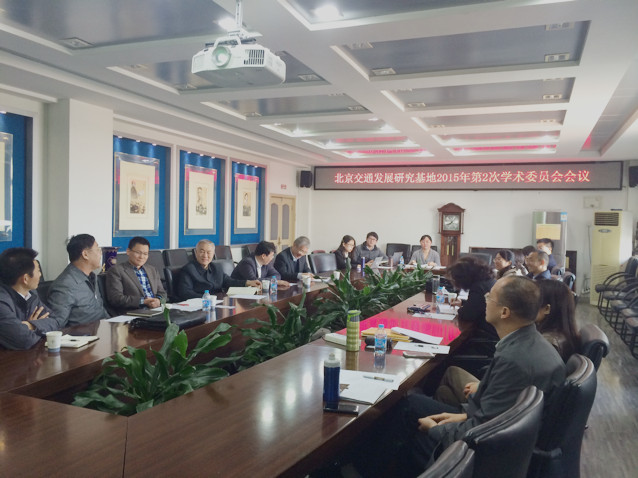At 10 a.m., April 17, Beijing traffic development research base held project research exchange meeting and the second academic meeting of 2015. Participants included Director Liu Jun of the Department of Research Bases of the Planning Office of Philosophy and Social Sciences of Beijing Municipality, Deputy Director Ye Long of the Department of Humanities and Social Sciences of Beijing Jiaotong University, Prof. Zhang Guoqiang, Director of Editorial of Comprehensive Transportation, Vice President Shi Xianliang of the School of Economics and Management, as well as academic committee members of the base such as Prof. Wang Dashu from the School of Economics of Peking University, Prof. Shi Meixia from Beijing Jiaotong University, and Prof. Bu Wei, Prof. Tong Qiong, Associate Prof. Chen Peihong. Prof. Lin Xiaoyan, who is in charge of the base, hosted the meeting. Prof. Rong Chaohe, chief scientist of the base, hosted the discussion of projects.
Presented projects at the meeting were: pResearch on management of Beijingos taxisq headed by Ye Long, pResearch on high-efficient working system of Beijingos railway transportation headed by Guo Ming, pStrategic research on development of Beijingos urban transportation in the context of new urbanization headed by Ren Ying, pTheoretical and practical research on development of urban cluster economy and railway transportation: taking the capital circle as an exampleq and pResearch on dynamic adaptation of urban development, economic cluster and urban traffic of Beijingq headed by Gao Hongwei. Among these projects, Prof. Ye Longos project periodic achievement has been published on Achievement Bulletin of the Planning Office of Philosophy and Social Sciences of Beijing Municipality, and received written instruction of Mayor Wang Anshun of Beijing Municipality.
Experts had a heated discussion around research contents of those projects. Prof. Zhang Guoqiang said, from the angle of industrial management, there was a periodic characteristic of taxi market as for whether the supply was in balance, in shortness or in excessive competence. He suggested discuss the legitimacy of special cars. Prof. Wang Dashu suggested make regulations to forbid taxi drivers to shift during rush working hour. As for the difficulty of calling taxi in bad weather like rain and snow, Prof. Wang Dashu thought the government should play its role to ask taxi companies to raise special insurance for taxi drivers, so as to increase taxi operation rate. Prof. Shi Meixia took monopoly as the biggest problem of current taxi industry. He said that the taxi drivers is one of groups with severe fatigue because of their bad working environment and gave some targeted suggestion as for the issue of labor dispatch put forward by research projects.
Prof. Tong Qiong said that workers in taxi industry were with low quality and small number because of the low salary. However, if limit of residence was relieved to increase taxi drivers, another problem of honesty and supervision would come up. Ever though need for taxi had been increasing in recent years, the number of taxi had nearly no increase. The government might take some measures, such as auditing taxi license, to make special cars legitimate. The most serious problem of taxi industry was monopoly, which needed us think about optimal use of resources. Prof. Bu Wei suggested divide taxis into three kinds of ordinary cars, rush hour cars and special cars, with respective license and insurance.
As for the project of pResearch on dynamic adaptation of urban development, economic cluster and urban traffic of Beijingq, Associate Prof. Chen Peihong gave some constructive suggestion from aspects of economic cluster, industrial cluster, division basis of urban development periods. The experts suggested that we use thinking of Internet plus and consider industrial mediation when researching industrial cluster, we should consider underground railway, high speed railway and suburban railway together when researching railway transportation, we should research the influence of railway transportation on future development of city from the angle of traffic and economic cluster.
Liu Jun made concluding remarks. As he said, arrangement of base projects should have plan and coordination. People in charge of the base and chief scientist should take responsibilities to master the relativity and persistency of projects, avoiding repetitive researches. Second, project heads should take responsibilities carry on research according to the contents of contracts and add some new contents according to real circumstances. Third, the Planning Office of Philosophy and Social Sciences should create honesty files for base projects, which was a double restrain for both the base and people in charge of projects. Periodic achievements of projects should be publicized in time and each project should have its iconic achievement.
This meeting enhanced management of base projects and masters progress of project researches comprehensively, especially some problems in them. Meanwhile, the meeting promoted academic exchange among teachers and different disciplines, providing new methods for more success in application for projects in future and for improving research level of the base. Participants of the meeting suggest more exchanges in future and enlarge openness to research teams of other universities.









